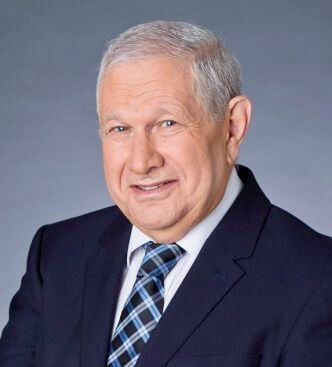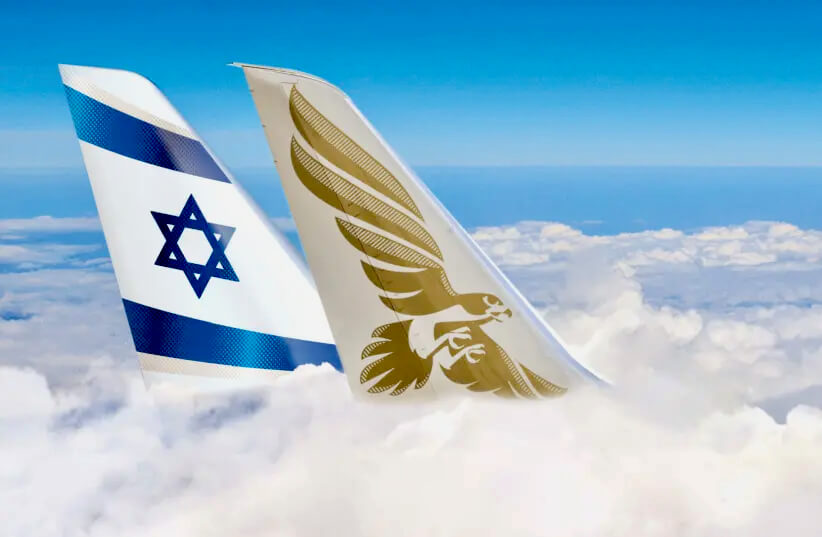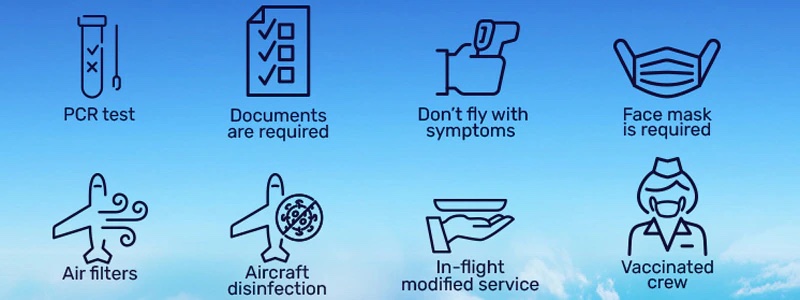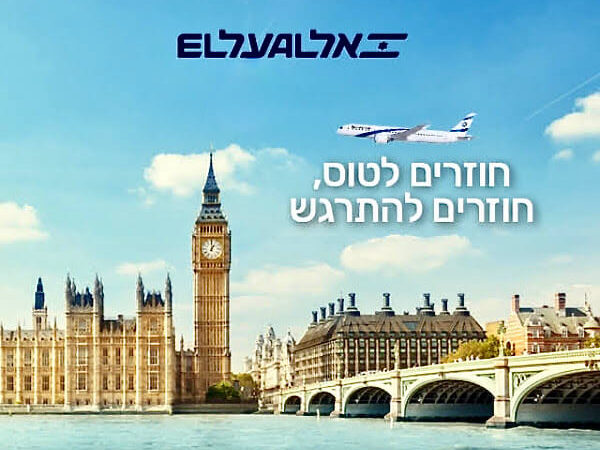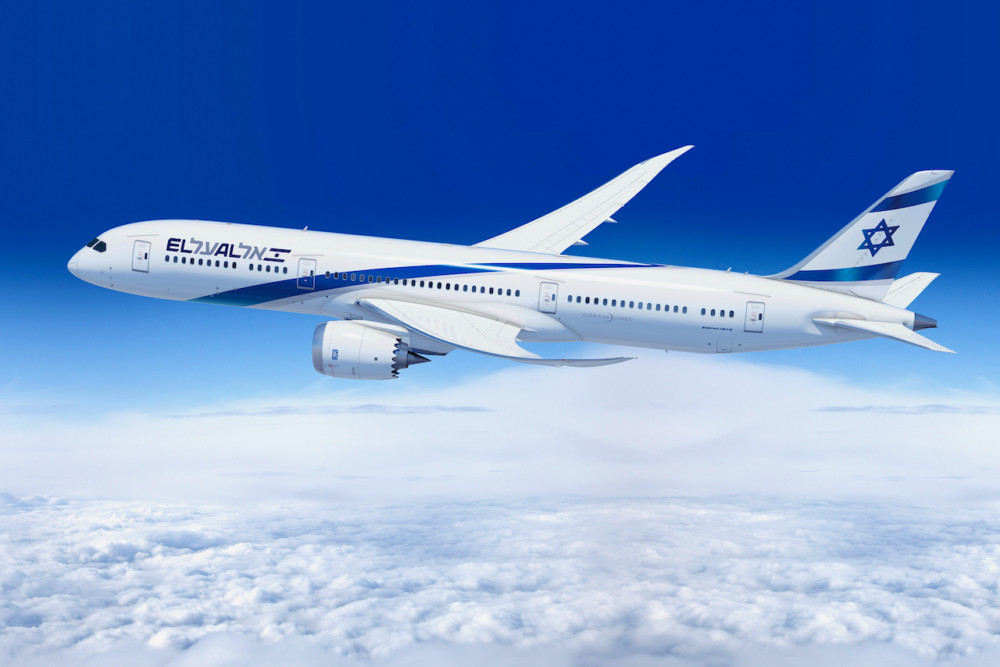
“I carried you on eagles wings” (Exodus 19:4)
Dawn of a New Decade – The Global Pandemic
As the 1st of January 2020 dawned, EL AL was optimistic about the future. It had received 14 new Boeing 787 Dreamliner aircraft, in a major renewal of its long-haul fleet, with two more scheduled for delivery in early 2020. EL AL now had a modern, young, wide-body fleet. It expected to realize soon the significant economic benefits of these advanced and more efficient and comfortable planes. Also, having opened several new routes in 2019, EL AL was preparing to open more new routes in 2020 – to Chicago, Dublin, Dusseldorf and Tokyo.
Yes, there had been a report out of Wuhan, China at the end of 2019 that Chinese health authorities were treating dozens of cases of ‘pneumonia’ of an unknown cause, followed by their identifying it a few days later as a new coronavirus, which became known as ‘Covid-19’. But that was in China – far away.
However, the Covid-19 virus proved to be highly contagious, and numerous deaths from it were occurring in China. During January 2020 the virus started spreading to many countries in Asia and Europe and to the United States. By 30 January 2020 the World Health Organization declared the Covid-19 virus outbreak a ‘global health emergency’, and on 11 March 2020 it recognized Covid-19 as a disastrous ‘global pandemic’.
Spiral to Shutdown of Regular Passenger Flights
As initially there was no vaccine to protect against the Covid-19 virus, countries tried to prevent its spread by imposing restrictions on travel, gatherings and events. This included closing flight routes, restricting travel to certain countries, and limiting entry of citizens of specified foreign countries into their territories. Some imposed mandatory quarantines of passengers arriving from outside the country and even complete prohibitions of entry from abroad.
The closing of numerous international airline routes, and sharp restrictions on passenger traffic, severely impacted virtually all airlines worldwide, and the entire aviation industry has experienced its greatest crisis in history. Several airlines have gone bankrupt. Numerous others, including leading international airlines, had to resort to financial bailouts by their home country governments. Due to the precipitous drop in passenger numbers, thousands of aircraft worldwide were placed in temporary storage and many older models even scrapped. At the same time, thousands of employees were placed on leave or dismissed as airlines tried to reduce heavy losses. IATA, the umbrella airline trade organization, estimated that the civil aviation industry suffered losses of about $118 billion in 2020.
EL AL could not escape the downward spiral caused by the unprecedented crisis. On 30 January 2020 it suspended passenger flights to Beijing, China. In February 2020 it suspended flights to Hong Kong and to Italy, and reduced flights to other European destinations, to Bangkok, Thailand, and to its destinations in the U.S. and Toronto, Canada.
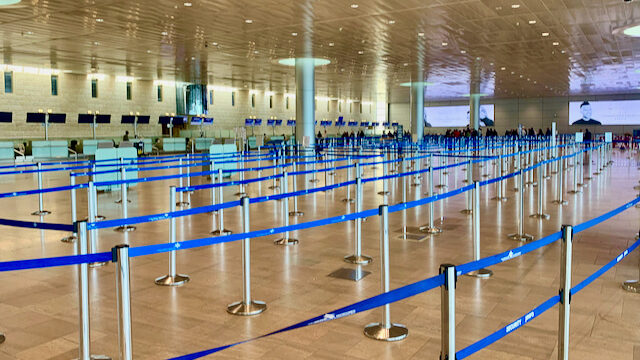
nearly empty due to the pandemic and cancelled flights. (Marvin G Goldman photo)
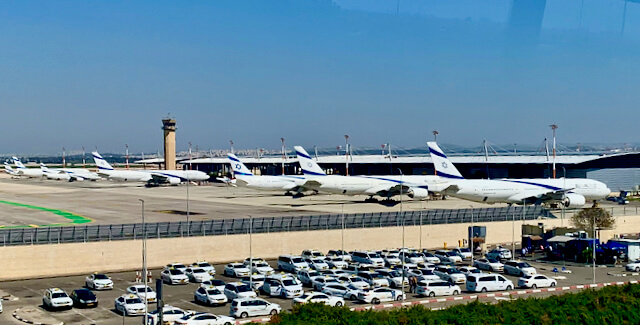
The first case of the virus in Israel itself occurred on 21 February 2020, and Israel started restricting certain travel, limiting gatherings and requiring social distancing. Nevertheless, the virus spread within Israel, as it did in other countries, and on 19 March the Israeli government announced a health emergency in the country. No one knew how long the pandemic would last nor the full extent of its possible severity, but one thing was clear. EL AL’s cash flow from operations was falling rapidly due to the drop-off of passengers, and further action had to be taken quickly. EL AL suspended its intended launch of new routes to Chicago, Dublin, Dusseldorf and Tokyo. It steadily had to drop more and more of its existing routes, and by late March 2020 EL AL was operating only a very limited number of passenger flights, and only to New York, Toronto, London, Paris and Johannesburg.
Most other airlines flying to and from Israel also stopped passenger operations on that route, and those few foreign airlines that continued to fly to Israel operated at a greatly reduced capacity. Tel Aviv’s Ben-Gurion Airport closed its Terminal 1 in early March 2020 due to the lack of flights, only keeping open, on a greatly reduced level, its Terminal 3.
By the last week of March 2020 there was an almost complete absence of demand for regular passenger flights to and from Israel. Finally, with very few customers traveling at all, on 27 March EL AL had to completely suspend its regularly scheduled passenger flights to all destinations.
EL AL ‘Rescue Flights’ Bring Stranded Travelers Home
The surge of worldwide travel restrictions and rapid evaporation of international passenger flights, due to the pandemic, left many Israelis on trips abroad stranded and unable to return to Israel. During March and April 2020 EL AL carried out many ‘rescue flights’ to unusual destinations to bring these Israelis home.
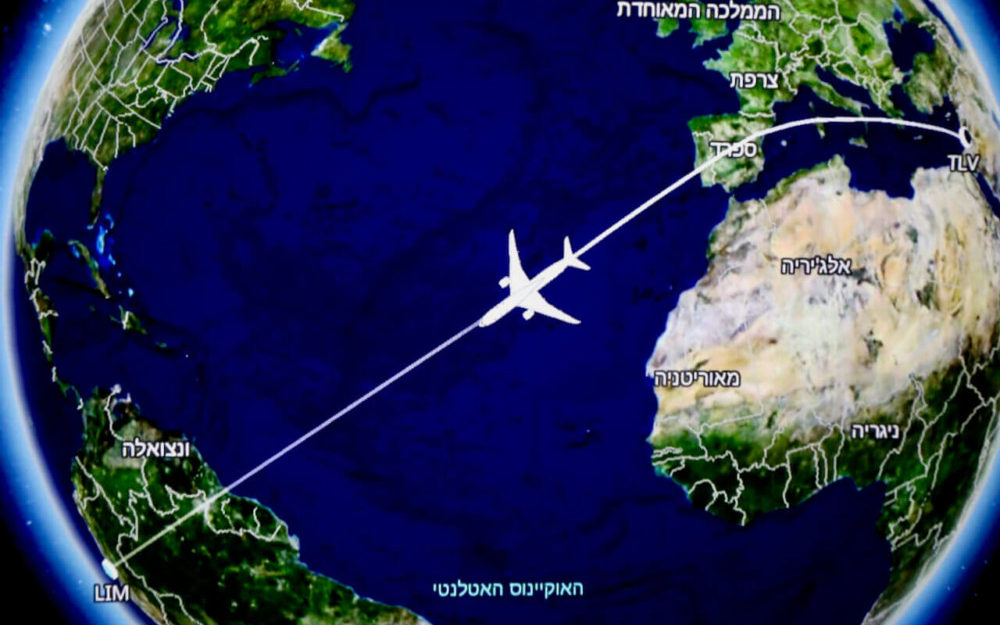
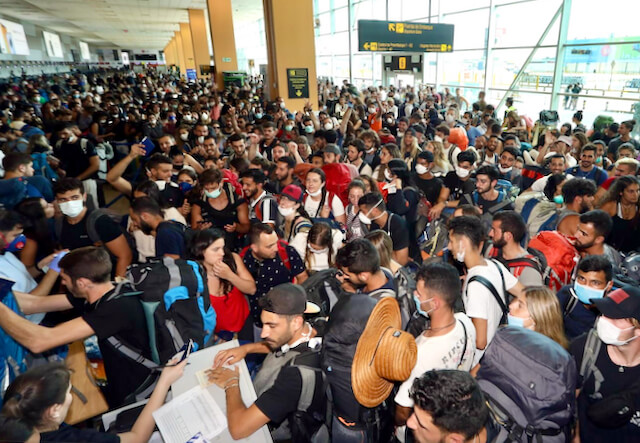
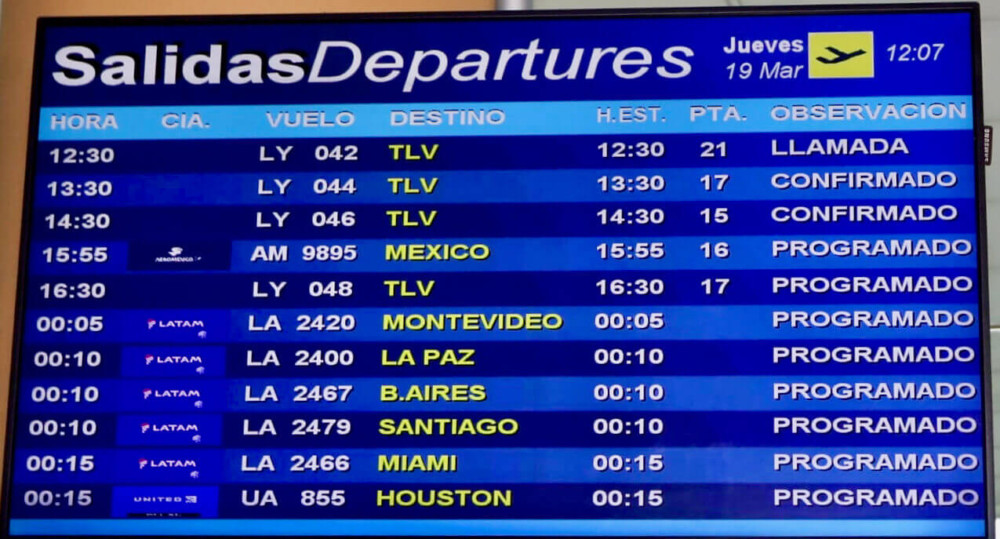
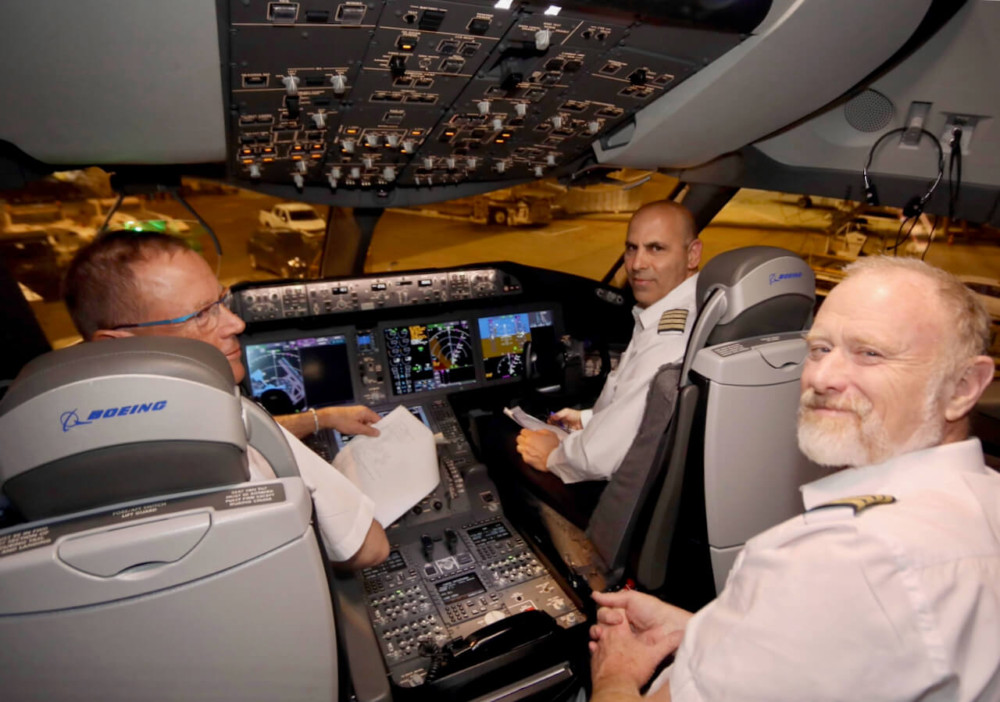
19 March 2020. (Sivan Farag photo)
On 23 March 2020 EL AL operated a rescue flight to Perth, Australia, carrying dozens of Australian tourists home from Israel, and bringing back Israelis returning from Australia, covering 11,077 km. nonstop.
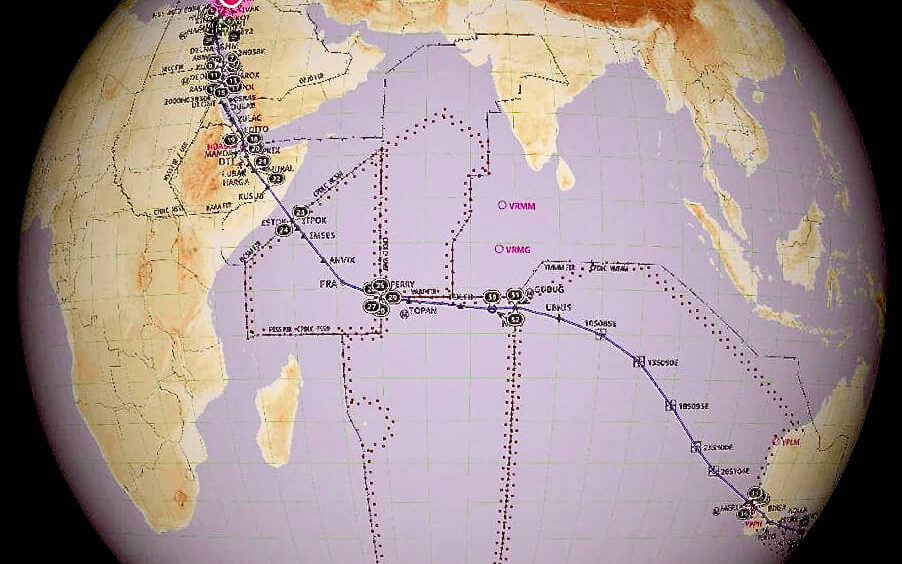
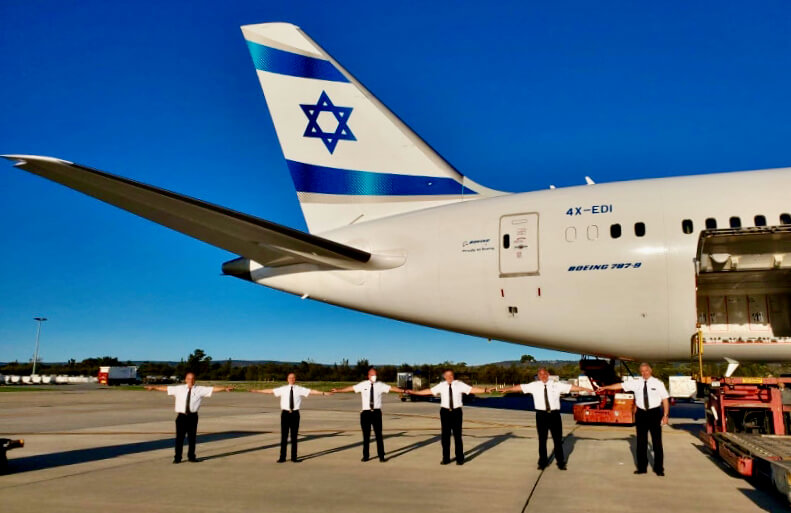
Even more impressively, on 1 April 2020 in a special flight to bring over 250 Israelis home from Melbourne, Australia, EL AL completed the longest nonstop flight ever by an Israeli airline – 13,736 km, 16 hr., 24 min. from Tel Aviv to Melbourne and 17 hr., 20 min. on the next day return, with 787-9 Dreamliner 4X-EDK.
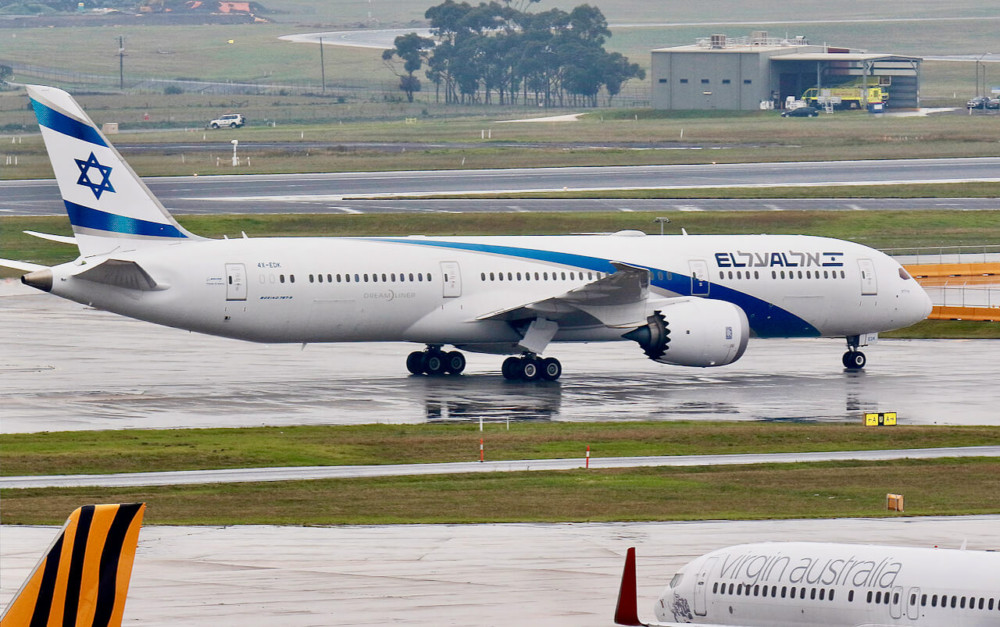
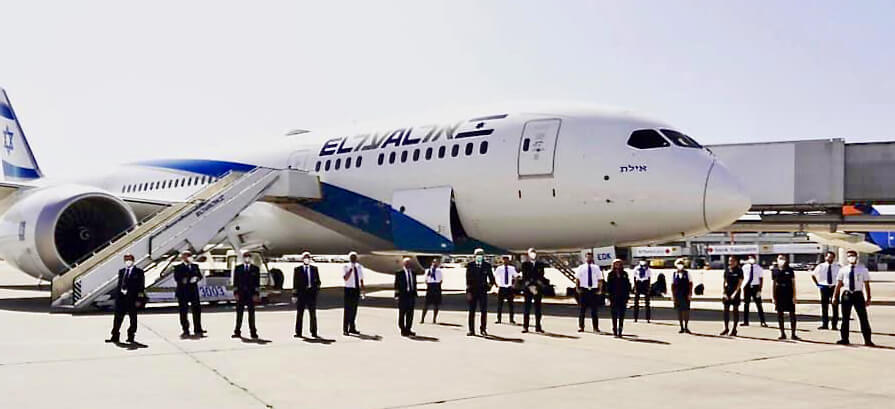
Additional complicated rescue flights were carried out by EL AL In March to Bogota, Colombia; San Jose, Costa Rica, and Delhi and Mumbai, India.
EL AL Cargo Flies Emergency Medical Equipment to Fight Covid-19
Because aircraft carrying passengers normally transport a significant amount of cargo in their bellies, the suspension of passenger flights to and from Israel caused a great shortage of air cargo transport affecting Israel. EL AL therefore started utilizing many of its passenger aircraft, including its new 787 Dreamliners, solely for cargo transport. It would carry equipment and supplies not only in the cargo hold of the aircraft but also in the passenger cabin by dismantling some of the passenger seats and using the extra cabin space for more cargo. EL AL also converted some of its 777s for solely cargo use.
The cargo activity included transporting huge amounts of needed emergency equipment and supplies to fight the Covid-19 pandemic. On 5 April 2020, EL AL started an airlift bringing personal protective equipment and other medical supplies from China to combat the Covid-19 virus in Israel, as well as dedicated flights to bring, among other things, essential medications from South Korea and India. Also in April 2020, EL AL commenced cargo flights from China via Israel to various destinations in the United States and Europe, transporting millions of vital medical items, including face masks and shields, ventilators and personal protective equipment. These flights then carried other cargo on their return to Israel.
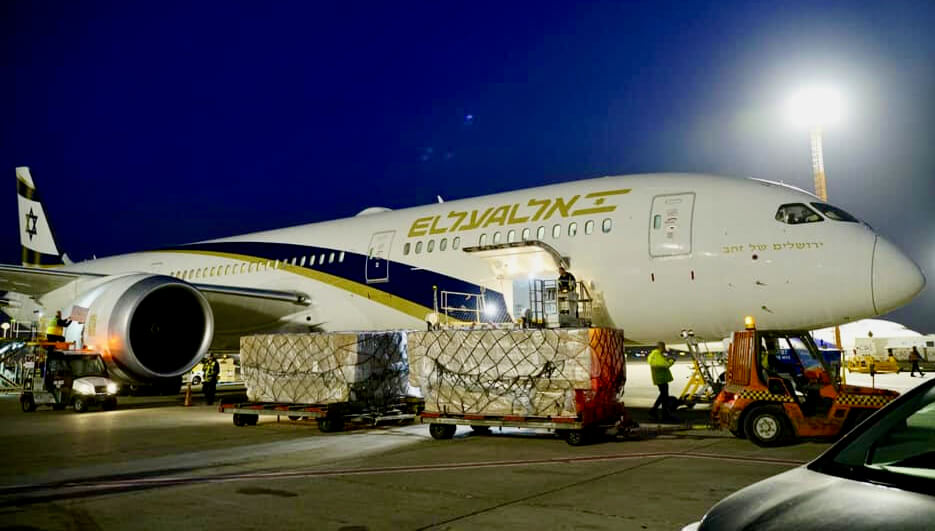
(EL AL/Israel Ministry of Defense)
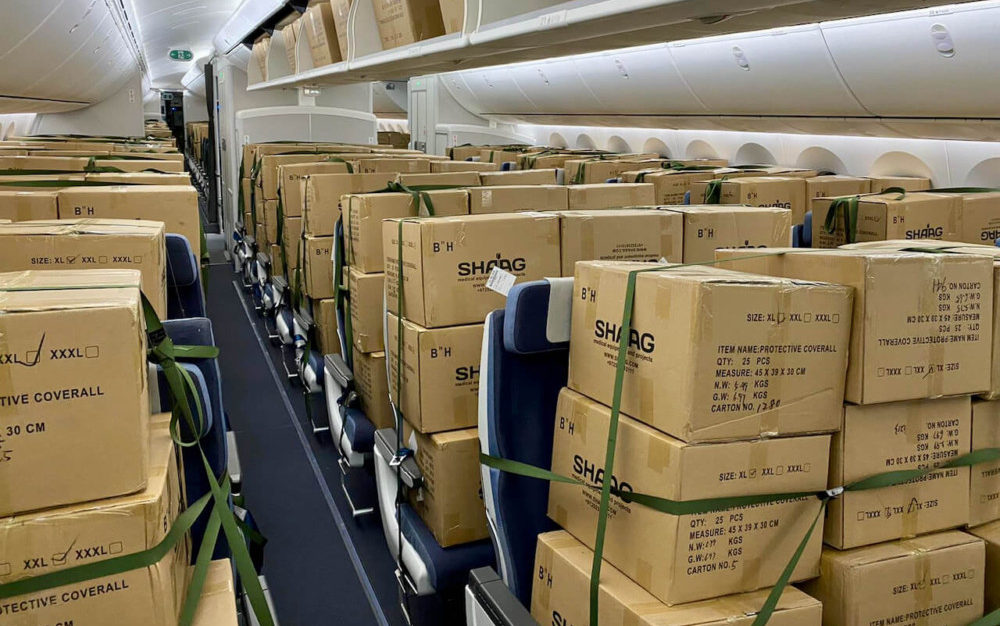
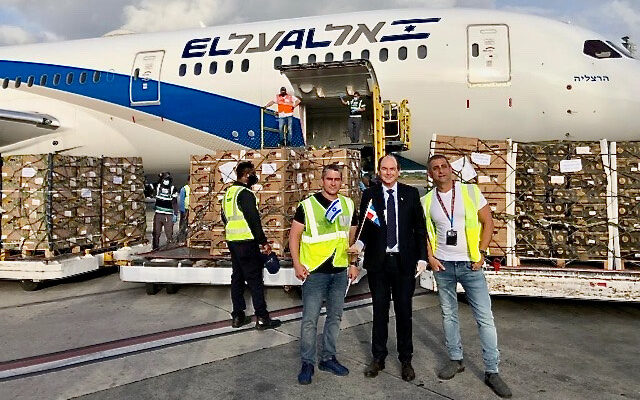
Financial Crisis Hits EL AL Hard
The Covid-19 pandemic and evaporation of scheduled passenger fights hit EL AL particularly hard. The airline already had been confronting fierce competition from other airlines, relatively high operating costs, plus the burden of $3 billion of debt, largely arising from its acquisition of 16 new 787 Dreamliners. With the modern and cost-efficient wide-body 787s, so important to its main routes, EL AL had expected to better compete, win back market share on its routes, expand destinations, and boost revenues and return to sustained profitability. Now that plan was in shambles. As travelers would not, or even could not, fly due to the pandemic, passenger revenue dropped precipitously. EL AL suffered a staggering net loss of $140 million in the 1st quarter of 2020. Moreover, it owed refunds on tickets for cancelled flights amounting to $285 million, while it lacked sufficient cash to pay its debts. The airline’s auditors added a note to its financial statements stating that the viability of EL AL as a going concern was in doubt.
EL AL had no choice but to reduce its cash expenditures as much as possible. Steps for this ‘streamlining’ process included, among others:
Staff: In March 2020 EL AL started placing employees on unpaid leave. By late March 2020 80% of its approximately 6,000 employees were on unpaid leave, and that number soon rose to over 90%. It also reduced work hours for managers, ended recruitment of new hires, terminated new employees in training, and reduced the compensation of executives and board members.
Aircraft and Spares: EL AL converted several of its wide-body aircraft to operate as cargo planes, because demand for international cargo transport continued, driven by the need for medical supplies to combat the Covid-19 pandemic. The airline also arranged to defer lease payments for some of its leased aircraft, returned to lessors three aircraft temporarily leased with crew, and cancelled lease agreements for two additional 737-800 aircraft expected in 2020. It also sold extra aircraft engines and surplus inventories.
Investments. EL AL suspended or canceled projects involving investments, such as the interior renewal of its 777 aircraft fleet and digital and computer-related investments.
In the second quarter of 2020, the Covid-19 pandemic further worsened. In April the Israeli government imposed a series of partial national ‘lockdowns’, temporarily banning travel and other activities. EL AL’s net loss for the first half of 2020 was $244 million, and its working capital at 30 June 2020 was a negative $135 million. Summing up the situation, EL AL’s President Gonen Usishkin stated: “The world is currently facing the deepest economic crisis it has known in the last 100 years. The aviation industry was the first to be hit by this crisis and will be the last to come out of it. Due to the continued pandemic, there is still a great deal of uncertainty around the world as to the timing at which the industry in general, and EL AL in particular, will return to regular and meaningful activity.”
On 1 July 2020 EL AL ordered all of its few aircraft still operating, including those on cargo flights, back to Israel, and totally stopped flying. No one knew how long the shutdown would continue, or whether EL AL had any viable future at all unless it received government aid, or additional private investment, or both.
Negotiations for Israeli Government Assistance
Virtually no airline could manage on its own with the economic consequences of the pandemic, and most airlines worldwide applied for, and received, government assistance. EL AL had to do the same, and in March 2020 it started negotiations with Israel’s Ministry of Finance to obtain a government loan sufficient to enable EL AL’s recovery.
During the negotiations, EL AL’s recovery plan recognized that the airline could continue operations only on a greatly reduced basis. Indeed the Ministry of Finance insisted that, before giving any government aid, EL AL would have to reach new agreements with its four main worker committees enabling it to decrease the number of employees by 1,600 to 2,000 (25-33%), reduce other labor costs and improve efficiency, show annual cost savings of $300-350 million, and cut its aircraft fleet and routes by about 25%. In effect EL AL would become, at least in the near term, a much smaller airline.
To meet one of the government’s conditions for aid, in June and July 2020 EL AL, and the Histadrut (General Federation of Labor in Israel) on behalf of the airline’s four main worker committees, signed separate recovery agreements as to each of the Company’s four employee segments — flight attendants, maintenance & engineering, administration, and pilots, all conditioned on EL AL reaching agreement with the government on a financial aid plan.
The Israeli government recognized the importance of EL AL to the country’s economy and security, and wanted the airline to survive. However, it did not wish to invest in or nationalize EL AL, and it declined to furnish direct grants or loans to the airline. Rather, it asked EL AL to seek bank loans, with the government guaranteeing repayment of a sizable portion of the loans. Also, the Ministry of Finance wanted EL AL’s controlling shareholder Knafaim Holdings (in turn controlled by certain members of the Borovich family), to invest substantial additional funds into EL AL, but no such investment was forthcoming.
On 7 June 2020, the Ministry of Finance proposed another alternative, namely, the government would give a 75% guarantee on bank loans aggregating $250 million and further, besides EL AL implementing the above-mentioned cost reductions, EL AL would make a public offering on the Tel Aviv Stock Exchange of additional shares of stock amounting to $150 million, with the State agreeing to purchase all shares not purchased by the public. This understanding was agreed to by EL AL’s Board of Directors on 6 July.
At that point several surprising developments took place. First, a report of 12 July stated that an investor named Eli Rozenberg, aided by a team of attorneys and leading influential figures in the Israeli business community, was looking into buying the controlling interest of Knafaim Holdings in EL AL. Eli Rozenberg was age 27 at the time and a yeshiva student living in Jerusalem. Although born in New York, he had become an Israeli citizen.
Notably, Eli Rozenberg’s father is Kenny (Naftali) Rozenberg, a U.S.-based businessman who is the founder, owner and CEO of Centers Health Care, which owns and operates dozens of nursing homes, rehabilitation centers and other health care facilities in New York and nearby states. Under the terms of EL AL’s privatization in 2005, only Israeli citizens can control EL AL. Although Kenny Rozenberg was not an Israeli citizen and therefore not eligible to acquire control of EL AL at the time, his son had the necessary Israeli citizenship.

Kenny Rozenberg
Eli Rozenberg offered $75 million for nearly 45% of EL AL’s shares (a percentage sufficient for control), and by 4 August 2020 he received a permit from Israel’s Companies Authority qualifying him to buy a controlling stake in EL AL. Even though EL AL was not expected to return to profitability in the near future, it was reported that Rozenberg wanted to buy control of EL AL because of patriotism and a belief that the airline has a good long-term future.
Then in mid-August two other businessmen entered the race to acquire control of EL AL – Meir Gurvitz, an Israeli-British businessman with real estate interests in the UK and U.S., and David Sapir, an Israeli-Russian businessman with tourism and telecom enterprises in Russia. Each of Gurvitz and Sapir separately offered to invest over $50 million in a private placement of EL AL shares and share control with Knafaim Holdings. Sapir also proposed dropping the planned public offering and claimed to have a bank commitment for a $400 million loan to ELAL if backed by a 75% government guarantee.
Rozenberg countered by raising his bid from $75 million to $101 million for a nearly 45% stake in EL AL’s shares, and added that he would purchase that much in the planned public offering of additional EL AL shares. He set up a new wholly-owned Israeli holding company, Kanfei Nesharim Aviation Ltd. (‘Wings of Eagles’ Aviation), to carry out that purchase. Although it was reported that the EL AL Board preferred a private placement and Sapir’s bid, the government insisted on going forward with a public offering. With certain adjustments to the public offering plan, EL AL ultimately agreed to it.
The public offering occurred on 15 September 2020. Eli Rozenberg and his company Kanfei Nesharim purchased about $108 million worth of EL AL shares in the offering, thereby acquiring 42.88% of EL AL’s total shares, sufficient to control the airline. Neither of the other two significant potential private bidders, Gurvitz or Sapir, nor Knafaim Holdings (the previous controlling shareholder), purchased any shares. Members of the public bought about $7 million worth of shares; and the State of Israel, per its agreement, bought the remaining offered shares unsold to the public, namely, about $35 million worth, bringing the State’s ownership of EL AL up to 14.37%. As a result of this offering, EL AL raised nearly $150 million of additional funds, and the percentage ownership by EL AL’s former controlling shareholder, Knafaim Holdings, fell to 15.21%.
New EL AL Management Appointed
On 2 October 2020 the State of Israel issued to Eli Rozenberg and his company Kanfei Nesharim a confirming permit to acquire control of EL AL, on the condition that they vote to appoint a board of directors and chief executive officer with specified experience and capabilities. Accordingly, on 20 October a new EL AL board of directors was appointed, with the Chairman being David Brodet, a former Chairman of Bank Leumi and former Director-General of Israel’s Ministry of Finance.
In late November 2020 the new board of directors appointed Avigal Soreq to replace Gonen Usishkin as chief executive officer of EL AL, effective in January 2021 after a transition period. At the time of his appointment, Soreq was Executive Vice President and Chief Operating Officer of Delek U.S., part of the Israeli energy and infrastructure conglomerate, Delek Group. Previously he was a business development manager of SunPower, and he served as a pilot in the Israel Air Force from 1996 to 2004, rising to the rank of Major.
The Covid-19 Pandemic, and EL AL’s Financial Crisis, Deepen
The nearly $150 million raised by EL AL in the 15 September public offering helped, but was not enough to meet its immediate needs. Almost at the same time, Israel was hit by a second Covid-19 wave, with soaring numbers of cases and deaths from the virus. In efforts to control the virus, the government imposed on 18 September a second, longer, three-week nationwide lockdown, and set more restrictions on travel through Tel Aviv’s Ben-Gurion Airport. EL AL resumed a limited number of flights to a few destinations in October, but the restrictions on entry and exit imposed by many countries sharply limited the number of passengers willing or able to fly, and a consistent flight schedule could not be maintained. Meanwhile, the airline was unable to arrange the $250 million of bank loans even with the 75% repayment guarantee promised by the government.
The 2020 Israeli air travel numbers and EL AL’s financial results reflected the disastrous consequences of the pandemic. Compared to 2019, the number of incoming tourists to Israel fell 81%, and Israeli residents traveling abroad were down 82%. In the last quarter of 2020 these numbers dropped 95% and 87% respectively from the comparable quarter the year before.
As a result, EL AL’s passenger numbers were down 84% in 2020, and 93% in the last quarter of that year. Cargo flights were less adversely impacted by the pandemic than passenger travel, but the worldwide economic slowdown from the coronavirus also led to a 10% decline in EL AL’s cargo tonnage transported in 2020. In all, EL AL incurred a staggering net loss of $531 million in 2020. Cash flow from operations was a negative $139 million, and the airline still owed $234 million to customers who had paid for flights that later had to be canceled.
To make matters worse, on 27 December 2020 Israel’s government imposed a third nationwide lockdown in a further effort to control the Covid-19 virus spread. The lockdown extended to Ben-Gurion Airport which, astonishingly, had to close completely to passenger traffic (except for very limited special cases) from 26 January to 6 March 2021.
As a consequence of the third lockdown, EL AL requested the Ministry of Finance to increase its guarantee to 82.5% of $300 million of bank loans. On 9 February 2021 the Ministry of Finance approved that increase provided that EL AL would raise at least an additional $75 million of funds through a public offering of stock options and that its new controlling shareholder (Eli Rozenberg and his company Knafaim Nesharim) purchase at least $50 million of those stock options. Rozenberg agreed, the offering was carried out on 14 February 2021, EL AL raised the additional $75 million (with more expected as options are exercised), and the Ministry of Finance increased its guarantee.
EL AL continued its negotiations with Israeli banks for loans, but the banks demanded annual interest of 28.6% for their loans, even with the enhanced 82.5% guarantee by the State. The Ministry of Finance rejected the banks’ proposal because of their high interest rate demands. Instead, in mid-March 2021 the Ministry came up with a new plan, with the following main elements:
- The government will give EL AL a $210 million advance to pay for flight tickets for aviation security officers on flights of EL AL and Sun d’Or for the next 20 years; EL AL will use those funds to pay debts owed to suppliers and customers.
- EL AL commits to implement its tough recovery plan, in order to save $400 million a year during 2021-2025, including laying off between 1,600 and 2,000 of its employees, up to nearly a third of its workforce;
- EL AL is to raise at least an additional $105 million by 31 July 2021 through a third public offering of shares of stock or stock options or both, with Rozenberg and Kanfei Nesharim to invest at least another $43 million in that offering.
- No dividends or repurchasing of shares by EL AL until the end of 2025, and certain limits thereafter; and certain further reductions in the compensation of EL AL’s management and directors.
Agreement on this new plan was reached on 18 March 2021, and it was formally approved by EL AL on 21 March and by the Israeli government’s cabinet on 9 May 2021.
Meanwhile, Kenny Rozenberg, father of Eli Rozenberg and believed to be the source of the funds invested in EL AL that gave his son and Kanfei Nesharim control of the airline, immigrated to Israel in March 2021. He thereby became an Israeli citizen, and he applied for, and received on 19 May 2021, a permit allowing him to become a controlling shareholder of EL AL.
EL AL Routes
As described at the beginning of this chapter, due to the Covid-19 virus and attempts to control its spread, Israel and numerous other countries imposed international travel restrictions, including required quarantines and at times complete prohibitions on travel to or from specified countries. Passenger traffic to and from Israel plunged to the point where EL AL had to stop regular scheduled passenger flights completely from end-March to end-September 2020.
— The ‘Abraham Accords’ and Routes to Arab Countries
Notwithstanding the pandemic, EL AL was able to participate in a bright development during this period. On 13 August 2020, Israel, the United Arab Emirates and the U.S. signed a joint statement initiating the normalization of diplomatic and other relations between Israel and the U.A.E. This was followed by similar normalization agreements on 15 September 2020 between Israel and Bahrain, and on 10 December 2020 between Israel and Morocco. These agreements are collectively referred to as the ‘Abraham Accords’, and they mark the first public normalization of relations between Israel and an Arab country since those with Egypt in 1979 and Jordan in 1994.
— United Arab Emirates (Abu Dhabi and Dubai).
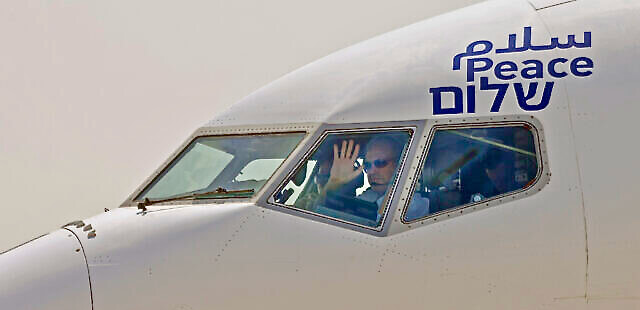
‘Kiryat Gat’, before taking off from Tel Aviv/Ben-Gurion Airport on a special first flight to Abu Dhabi, United Arab Emirates, carrying Israeli and U.S. delegates to meet with U.A.E. counterparts for implementing Israel-U.A.E. diplomatic relations, 31 August 2020. The word ‘Peace’ appears in Arabic, English and Hebrew. (EL AL)
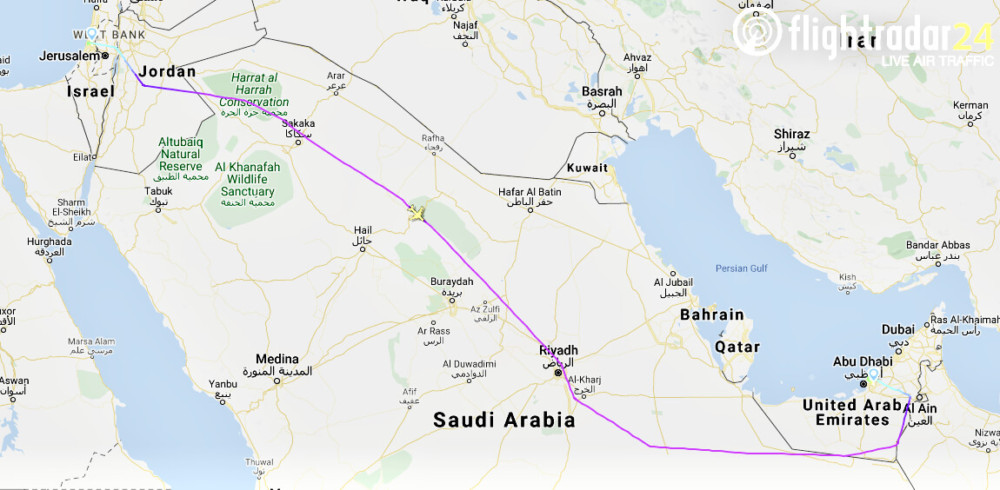
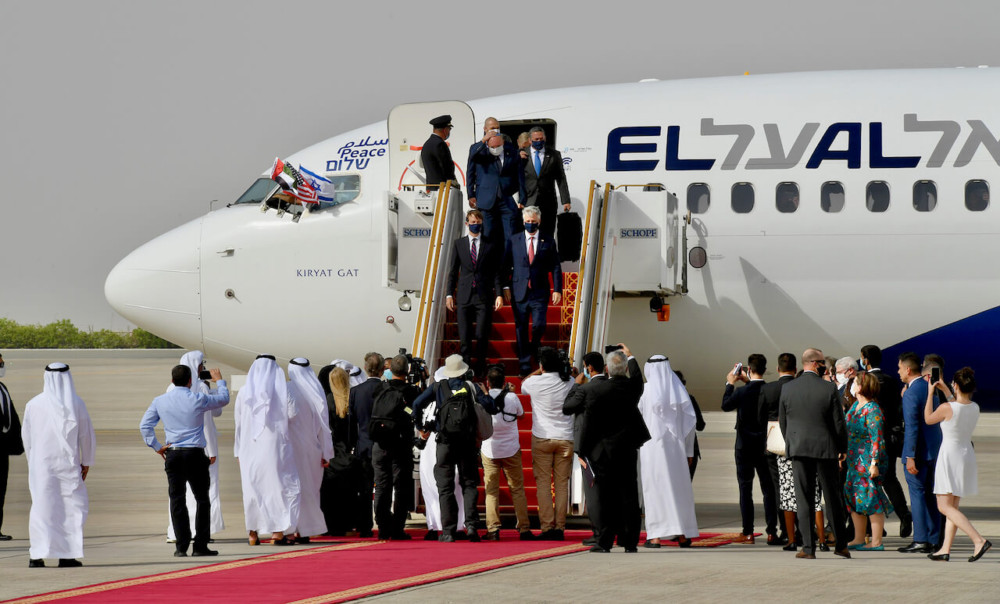
Wikimedia Commons, CC-BY-SA 2.0)

On 16 September 2020 EL AL operated the first Israeli airline cargo flight to Dubai of the U.A.E. This was followed by EL AL’s first passenger flight to Dubai, on 13 December 2020.
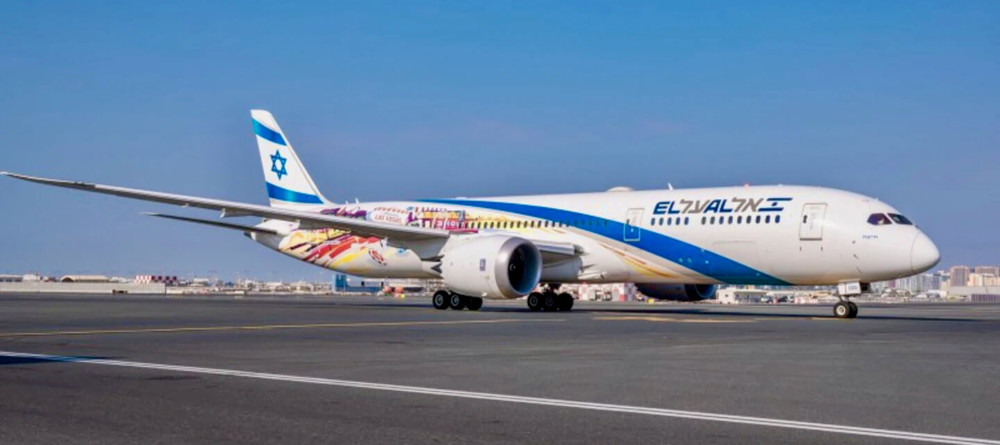
— Bahrain.On 18 October 2020 EL AL, carrying an Israeli-U.S. delegation, operated its first flight ever to Bahrain, another of the ‘Gulf’ States. Then, on 3 December 2020, EL AL and Gulf Air, the national carrier of Bahrain, signed a collaboration Memorandum of Understanding to discuss potential code share agreements for flights between Bahrain and Israel and global flight networks beyond.
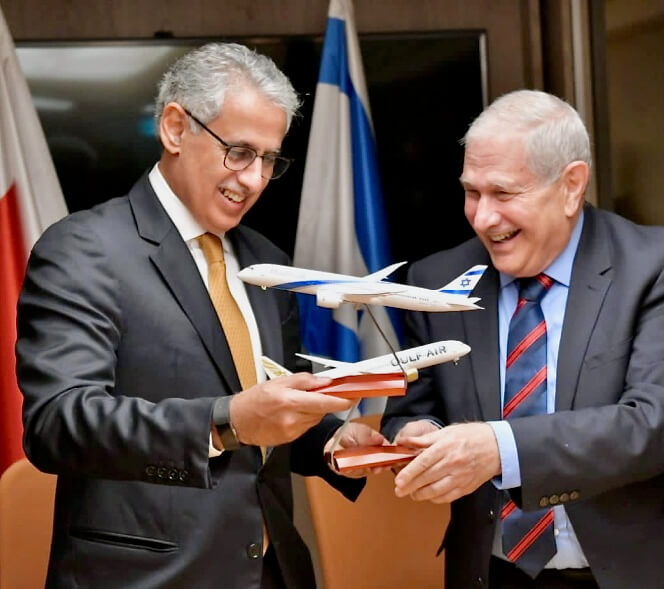
— Morocco. On 22 December 2020 EL AL operated the first flight from Israel to Rabat, capital of Morocco, carrying an Israeli-U.S. delegation, and on 12 January 2021 Israel and Morocco signed an agreement opening the opportunity for future scheduled direct flights between the two countries.

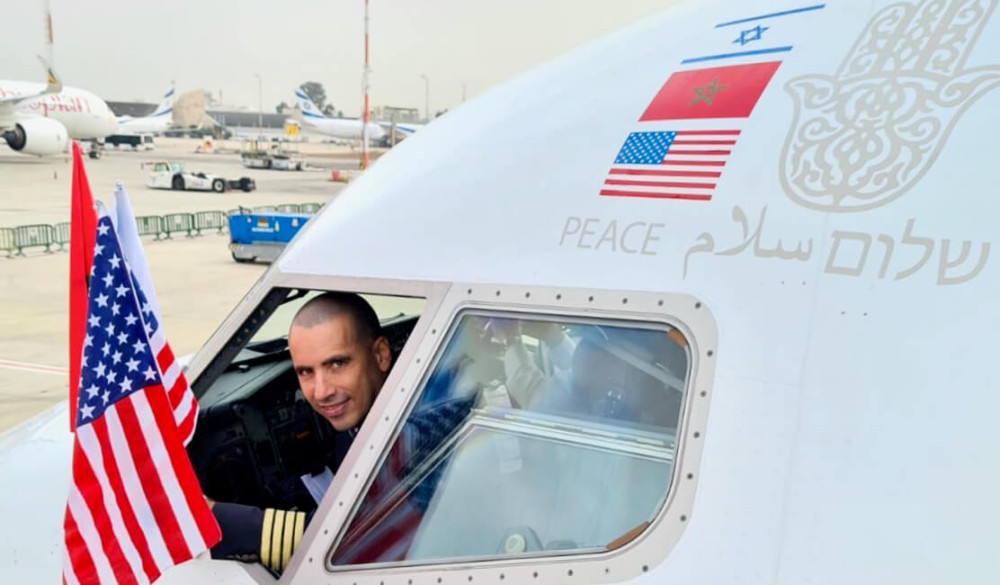
Scheduled Passenger Flights Start and Stop Again
In October 2020, after Israel lifted its second national lockdown, EL AL started to gradually resume a limited number of passenger flights. Initially these were to New York, Miami and Los Angeles in the U.S., London, Paris, Frankfurt, Amsterdam, Athens, Sofia and Kiev; and by mid-December 2020 EL AL started regularly scheduled flights to Dubai and the Seychelles. However, Israel was soon hit with another wave of Covid-19 infections and its government imposed on 27 December 2020 yet another national lockdown and started to require incoming passengers from any country to quarantine in Israeli hotel rooms set aside for that purpose. The new routes to Dubai and the Seychelles were quickly suspended, and the other routes were reduced and then discontinued again when, astonishingly, Ben-Gurion Airport was closed to all passenger traffic (except for very limited special cases) from 26 January to 6 March 2021.
Resumed Scheduled Flights Confront Complex, Changing, Restrictions
Although Ben-Gurion Airport reopened in March 2021, travelers still faced many restrictions on entry and exit imposed by Israel and other countries. For example, In early June 2021 foreign nationals were allowed entry to Israel only in exceptional cases or in a limited number of small vaccinated groups. All inbound passengers, including Israeli citizens and residents, before boarding, had to submit online an inbound passenger statement containing required health information, and depending on the information submitted would either be cleared or denied to board their flight. A negative Covid-19 PCR test, taken not more than 72 hours before boarding, also had to be presented. All arriving passengers were required to go into isolation in a state-allocated accommodation upon arrival, the usual duration being 14 days (except that holders of an Israeli vaccination certificate or recovery certificate were exempted from the isolation requirement provided they had not visited any of nine specified countries within 14 days preceding their arrival in Israel).
Moreover, these restrictions changed constantly, even as often as daily, as Israel and other countries battled the new and more contagious ‘Delta’ and ‘Omicron’ Covid-19 variants that became the respective dominant strains in the second half of 2021. Israel started designating countries as ‘red’ (highest risk), ‘orange’ (at risk) or ‘yellow’ (low risk). Non-Israelis from ‘red’ countries were banned from entering Israel, and Israelis were prohibited to travel to ‘red’ countries, except in extremely limited cases. Most of EL AL’a destinations came under these ‘red’ restrictions at one time or another, including its main one, the United States, which was added to the ‘red’ list on 22 December 2021.
These restrictions sharply curtailed air travel into and out of Israel and severely impacted the entire Israeli tourism industry. The constant changes also meant that EL AL could not operate a predictable schedule. Many flights had to be cancelled when their destinations suddenly found themselves on the ‘red’ list, and Covid surges affected the ability of many ticketed passengers to travel on their flight dates. EL AL responded by allowing ticketed passengers (except those in the basic ‘LITE’ class) to change their date or destination of travel without a change fee, or to cancel their ticket without a change fee in exchange for a travel voucher for a future flight.
The Israeli government, trying to balance health and economic considerations, and noting that travelers from abroad were becoming a small factor in the spread of the Covid virus in Israel, removed on 8 January 2022 all destinations from the ‘red’ list, while retaining many complex requirements relating to vaccinations, Covid tests and quarantines. As the severity of the Covid panedemic continued to ease, Israel further relaxed its Covid-related travel restrictions, and they were removed entirely by May 2023.
Competition. EL AL will likely continue to face the intense competition described in the preceding chapter (Chapter 12). For example, competition has risen further on its flagship route — trans-Atlantic between Israel and the U.S. American Airlines returned to the Israel market with nonstop flights to Tel Aviv from New York-JFK and Miami. Delta Airlines increased its frequencies on the JFK-Tel Aviv route and added Boston-Tel Aviv, while United Airlines increased nonstop frequencies between Newark and Tel Aviv while also flying to Tel Aviv nonstop from Chicago, San Francisco and Washington DC.
EL AL Continues to Be Israel’s Lifeline
In May 2021 Israel again had to defend itself from thousands of deadly rockets launched against it by Hamas, the designated terrorist group ruling Palestinians in Gaza. During the course of the 11-day war, Hamas indiscriminately aimed at Israeli civilian targets, including at Tel Aviv’s Ben-Gurion Airport. That airport even shut down briefly on 13 May, and some flights were rerouted to Israel’s new Ramon Airport near its southern resort city of Eilat. Once again, almost all foreign airlines, including American, Delta and United from the U.S., cancelled their flights to Israel, but EL AL continued to fly and be Israel’s lifeline to the world.
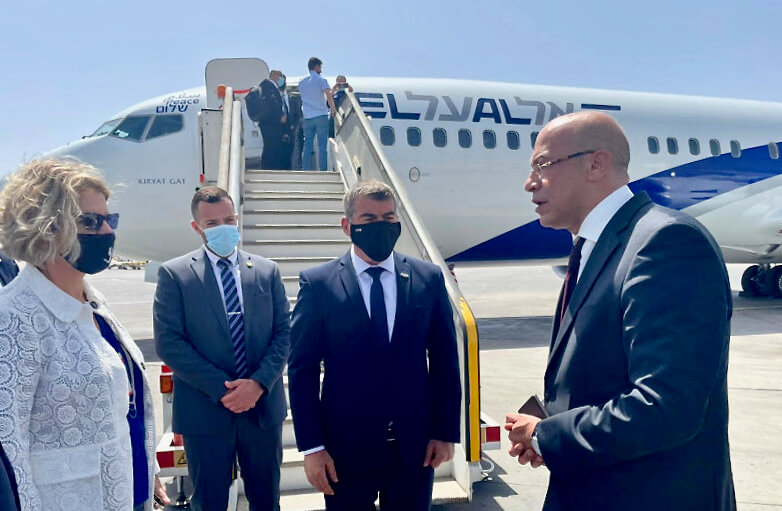
Shabbat Flights
EL AL has been known as the’306-day-a-year’ airline because it does not operate scheduled passenger service on Shabbat (the Jewish Sabbath from Friday sundown to Saturday sundown) or on major Jewish holidays. Conversely, EL AL’s main competitors do operate flights to and from Tel Aviv on those days.
As a privately controlled airline, EL AL is not required to consider the same schedule sensitivities as when it was controlled by the Israeli government. Nevertheless, under private control it has retained its policy of not operating passenger flights on Shabbat or major Jewish holidays. Its new controlling owners, Rozenberg and Knafaim Nesharim, have indicated that this policy will continue.
In the past, passenger charter flights marketed by EL AL’s subsidiary Sun d’Or, typically with leased aircraft, sometimes did operate on the Sabbath and Jewish holidays, but under its new controlling owners, Sun d’Or has stopped flying on those days as well. (Cargo flights, all of which are with leased aircraft or aircraft operated by others, and necessary aircraft maintenance, are still carried out on all days).
Although some estimate that this policy costs millions of dollars annually in lost revenue, the absence of Shabbat flights for passenger operations is not considered to be detrimental. Rather, the practice is viewed as a matter of customer service and respect, particularly for the large number of religious Jewish travelers.
EL AL’s 2021 Recovery and Efficiency Plan; and Need for Additional Financial Aid
EL AL’s new management targeted reaching an even balance between its cash inflow and outflow (halting its negative cash flow) by the end of 2021. Elements of the plan for 2021 included:
— implementing the 2020 efficiency agreements reached with its different employee sectors;
— raising $105 additional capital investment including a $43 million commitment from its controlling shareholder (over and above the approximately $150 million raised by the issuance of stock in 2020 and $83 million by the issuance and exercise of stock options in the first quarter of 2021);
— utilizing the $210 million advance from the Israeli government to pay debts owed to suppliers, and to customers who purchased tickets for flights canceled due to the pandemic;
— stretching out loan and lease payments; and
— gradually increasing flights and adjusting its route network as pandemic restrictions of different countries ease and passenger demand returns, while concentrating on its core destinations and target public.
The plan’s targets of raising additional capital investment in 2021, and halting negative cash flows by the end of 2021 were not met, however. The emergence of the Covid-19 virus variants ‘Delta’ and ‘Omicron’ in 2021, and the resultant increased and constantly changing restrictions on air travel in and out of Israel, led to continued financial losses that year and delayed raising additional financing and government aid.
During 2021 EL AL continued to negotiate with Israel’s Ministry of Finance on an additional financial aid package. The contours of an agreement in principle were reached in early January 2022, with the Ministry of Finance agreeing to provide up to an $85 million aid package for Israel’s three airlines — EL AL, Arkia and Israir — to help them survive the Covid crisis, on condition that their respective controlling shareholders inject additional capital investment. The airlines would share that amount in proportion to their relative size, so EL AL would receive the great majority of the aid. The government, in return for its investment, would receive bonds issued by the airlines that mature in three years and would be convertible into shares of stock, provided that the government’s stake in any of the three airlines is not to exceed 24%. EL AL would be required to implement further ‘streamlining’ of operations, including additional reductions in its work force, number of aircraft, and number of routes.
On 23 January 2022 EL AL signed agreements with the government, and with EL AL’s controlling shareholder Kanfei Nesharim (owned by Rozenberg) which then held 40% of EL AL’s shares, whereby the government granted loans, and early payments for extra fuel consumption, aggregating $50 million; while the controlling shareholder granted further loans to EL AL amounting to $20 million. These amounts were over and above previous aid and loans to the airline provided by the government and EL AL’s controlling shareholder.
Probably the most painful element was the requirement to part ways with about one-third of its work force in order to meet Israeli government demands for more efficiency as a condition to obtaining needed financial assistance. By the end of 2021 the number of employees declined by about 1,900. Efficiency agreements reached with the different employee sectors also included changes in work processes, eliminating excess inputs, and maximizing the airline’s existing resources. Management expects the resultant savings to continue even with the full return of the airline’s activity.
Another major challenge for EL AL was the need to regain customer confidence. The precipitous drop in passenger traffic and revenue starting in early 2020, due to the Covid-19 pandemic, left EL AL with little or no available cash to continue giving refunds to passengers who had paid for flights that later had to be cancelled. In the third quarter of 2020 the airline started offering, as a substitute for cash refunds, vouchers for future flights, with each voucher having a value 25% more than the amount paid for the original cancelled flight. Then when EL AL finally received additional capital investments and government advances in 2020, it prioritized the settlement in full of all its customer refund obligations, which it completed in mid-2021. The airline also introduced greater flexibility on flight ticket changes and cancellations.
EL AL’s new management is also exploring ways to expand the use of its iconic ‘EL AL’ brand name among Israelis and those around the world with a connection to the State of Israel. Among other things, it is considering entry to related sectors such as tourism and hotels in order to increase and diversify its sources of revenue. It is also giving emphasis to increasing value for the members of its ‘Matmid’ frequent flyer club which is considered to be an important source of revenue and a major growth engine.
In early February 2022 EL AL entered into a non-binding memorandum of understanding with Arkia, one of Israel’s two other significant airlines, whereby EL AL would acquire Arkia and turn it into a low cost airline subsidiary. However, the Israel Competition Authority refused to approve the acquisition and the proposal was dropped.
At the end of March 2022 EL AL President Avigal Soreq announced that he would be resigning his position to become the CEO of the energy company Delek U.S. Shortly thereafter EL AL appointed Dina Ben-Tal Ganancia to be its next President, and she assumed the position on 1 June 2022. A 14-year veteran at EL AL, she is EL AL’s first woman chief executive officer and one of the few women CEOs in the airline industry.
Summer 2022 Brings Even More Challenges
During Spring 2022 Israel’s then-latest Covid surge started to ease, and on 30 May 2022 the Israeli Government (like others) greatly relaxed Covid vaccination and testing requirements in respect of air travel. The worldwide easing led to a surge in air travel demand for which airlines including EL AL, and airports including Tel Aviv’s Ben-Gurion Airport, were unprepared. The sharp reductions in airline and airport staff during the peak of the pandemic could not be quickly reversed. Lines at airports lengthened, and airlines had to cancel many flights due to shortages of staff, particularly pilots.
In EL AL’s case, the pilot shortage was intensified as many of its pilots were unsatisfied with the cuts to their compensation and revised work rules imposed during the height of the pandemic and due to EL AL’s financial difficulties. A higher portion than usual of pilots scheduled to operate certain flights were calling in sick, and sufficient replacements were not available. This led to many flight cancellations, some at the last hour, with the resultant loss of revenue and harm to customer service and confidence. Also, EL AL has wanted to reactivate its fleet of six Boeing 777-200 aircraft, but this required renewed crew training which was delayed. The airline engaged in prolonged negotiations with representatives of its pilots in an effort to resolve their disputes.
Finally, on 10 July 2022 EL AL’s management and the pilots committee signed an agreement whereby the pilots’ salaries are gradually restored to their pre-Covid levels and the flight disruptions and cancellations ended. The pilots also agreed to undergo retraining for operating EL AL’s fleet of six 777s which are being refurbished to re-enter service after having been grounded since 2020. The 777s mainly supplement the need for more long-haul flights, particularly to the Far East.
Route Developments
EL AL’s route network has been modified frequently since early 2020, due to the COVID-19 pandemic, changes in competition, fleet size limitations, and political relations with certain Arab countries. Flights to several cities have ended, while new destinations have been added. As of the end of September 2023, EL AL operated regular scheduled flights from Tel Aviv to 46 destinations — 33 in western and eastern Europe (six of which are flown under the brand of its subsidiary, Sun d’Or), six in North America (New York, Newark, Boston, Miami and Fort Lauderdale in Florida, and Los Angeles); three in Africa (Marrakech, Morocco; Sharm El Sheikh, Egypt under the Sun d’Or brand; and Johannesburg, South Africa); and four in Asia (Dubai in the United Arab Emirates, Bangkok and Phuket in Thailand, and Tokyo, Japan). Moreover, the airline operates special or seasonal flights to other destinations, many under its Sun d’Or brand.
The airline further indicated its intent to reactivate or add more routes to the Far East, including Mumbai and New Delhi, and to North America; and to commence scheduled service to Melbourne, Australia by June 2024. Routes from Israel to the East and Australia could benefit from recent approvals by Saudi Arabia and Oman that allowed Israeli airlines to overfly their countries, thereby reducing flight times from Tel Aviv to destinations in the Far East and beyond by some 2-1/2 hours.
— Disruption by Hamas attack and Gaza war. On 7 October 2023 Gaza’s Hamas terrorists launched a surprise attack on Israel. massacred over 1,200 Israelis and kidnapped over 200 Israeli hostages. Israel responded by carrying out a war in Gaza aimed at eliminating Hamas and its terrorist infrastructure and rescuing the hostages. While nearly all other airlines have stopped flying to Israel due to the war, EL AL has continued flying to and from Israel. As demand for service from different countries significantly changed due to the war, EL AL has had to change its schedules, reducing or eliminating flights to certain destinations, while increasing the number of flights to other places such as those in the United States.
Presently, EL AL is not a member of any worldwide airline alliance. However, it does participate in ‘codeshare’ commercial agreements with several airlines. A codeshare arrangement allows the sharing airlines to market one another’s flights on certain routes. A seat can be purchased on one airline but the flight can actually be operated in at least one flight segment by the cooperating airline under a different flight number or code. EL AL currently has codeshare arrangements in respect of certain flight itineraries originating or terminating in Tel Aviv, with Aerolineas Argentinas, Aeromexico, Air China, Alaska Airlines, American Airlines, Bangkok Airways, Delta Air Lines, Ethiopian Airlines, Etihad Airways, Hong Kong Airlines, Iberia, jetBlue, LOT Polish Airlines, Qantas, Royal Air Maroc, Siberia (S7) Airlines, Swiss International Air Lines, TAP Portugal, Thai Airways and Vietnam Airlines. Several of EL AL’s code share arrangements with other airlines also allow for reciprocal participation in each other’s frequent flyer programs.
— EL AL’s Frequent Flyer (‘Matmid’) Program. On 1 September 2023 EL AL launched an improved ‘Matmid’ frequent flyer program. The new program introduces more flexibility and broadens opportunities to earn, retain and redeem points.
* * *
EL AL has faced several enormous challenges in the past, such as its shutdown and receivership in 1982, but it has emerged each time as a stronger airline. The Covid-19 pandemic led, however, to the greatest civil aviation crisis in history for EL AL and most other airlines worldwide. The question has been how EL AL would emerge from this crisis.
The ingredients for future success have started to come together. EL AL has a new modern 787 ‘Dreamliner’ wide-body fleet, recent capital investment and financial assistance, efficiency agreements with its employees and a new agreement with its pilots, a comprehensive recovery plan, and an energized management team. It has aimed to restore a high level of customer service and confidence, and it received a 2023 ‘Five Star Global Middle East and Africa’ Award from APEX — The Airline Passenger Experience Association. Moreover, starting with the fourth quarter of 2022, it has returned to profitable operations. EL AL can look forward to being a better, more competitive, airline, worthy of carrying the flag of the State of Israel as its ‘Flying Star’.
Last updated 17 December 2023.
Copyright 2021-2023, Marvin G. Goldman
